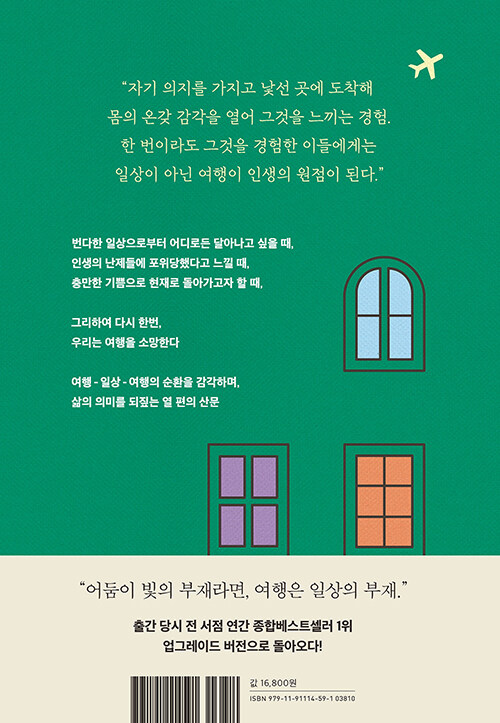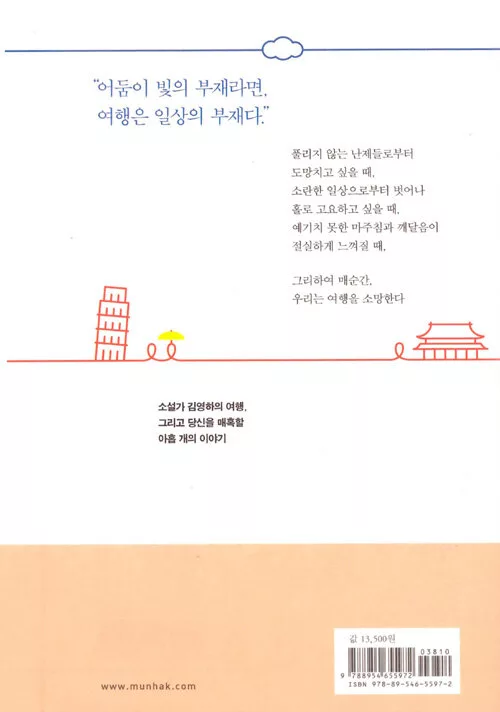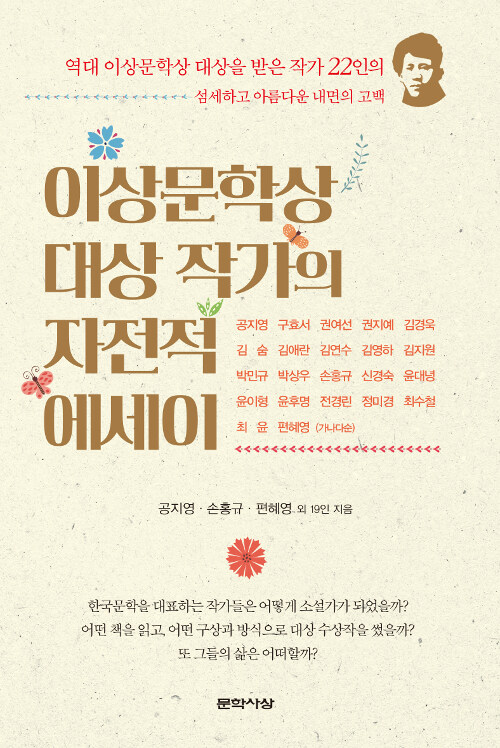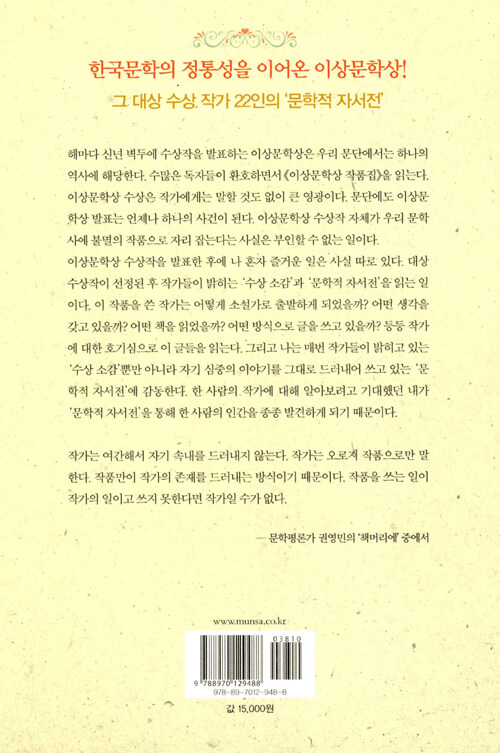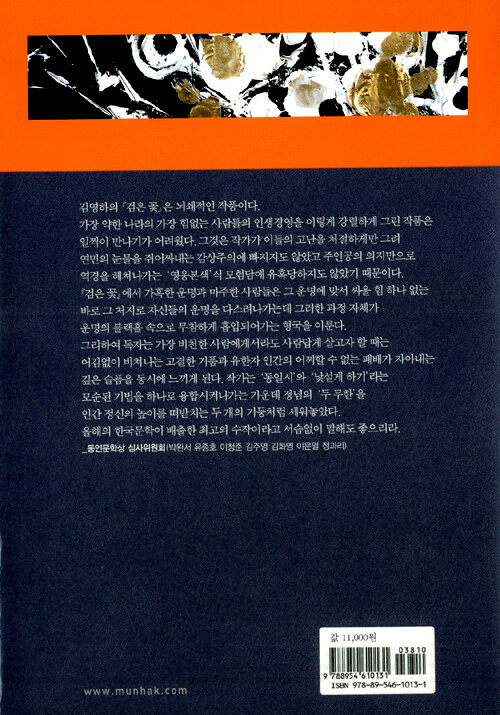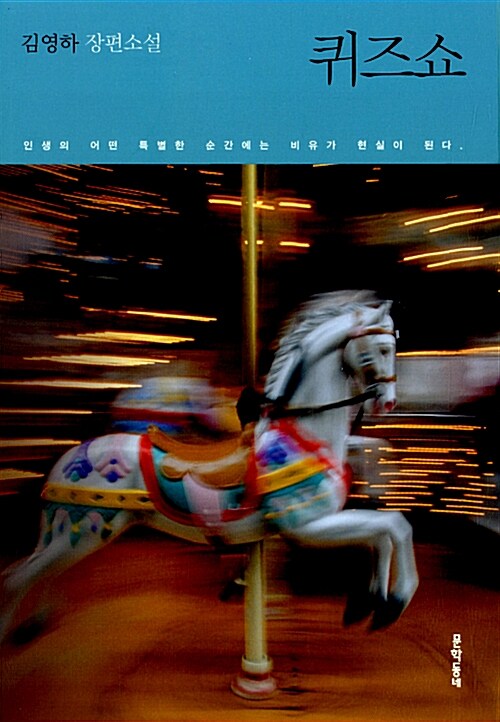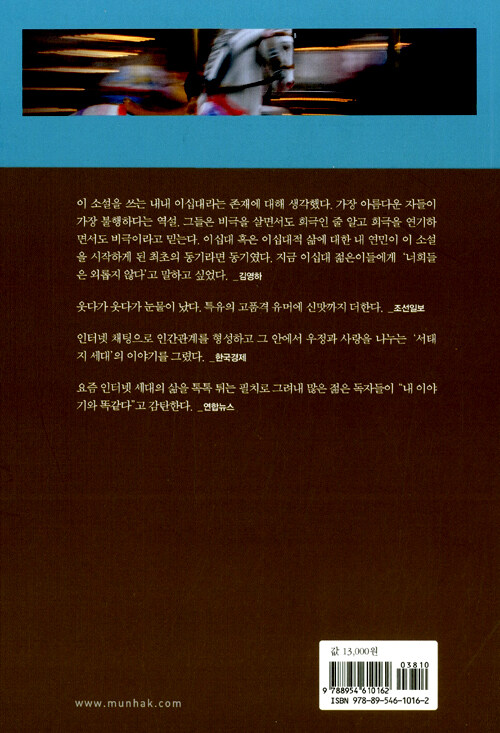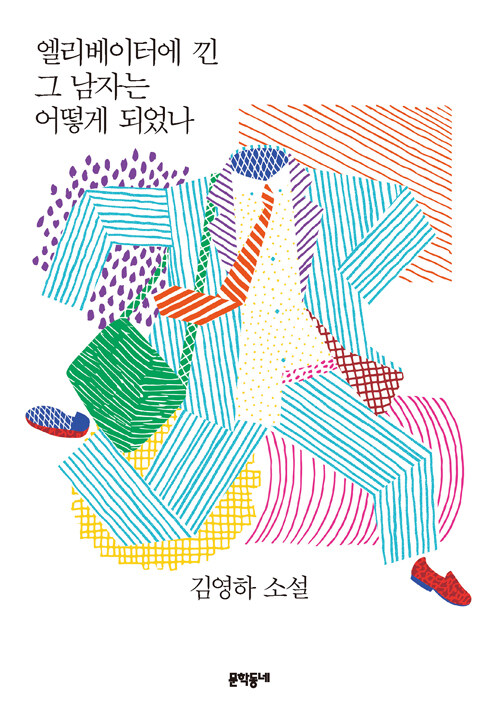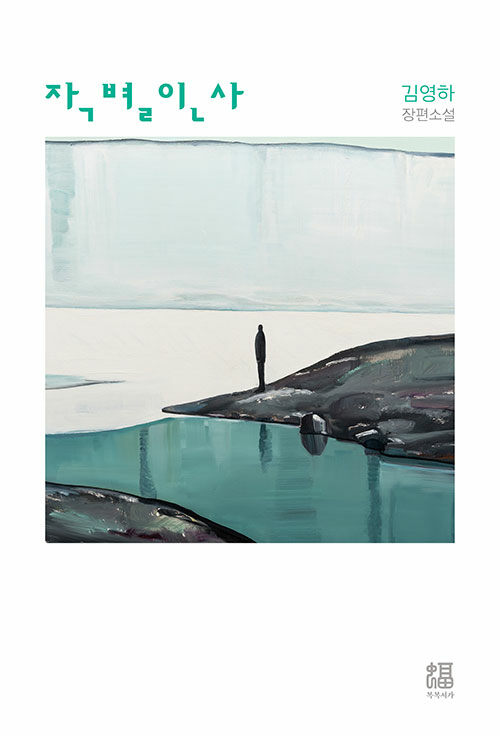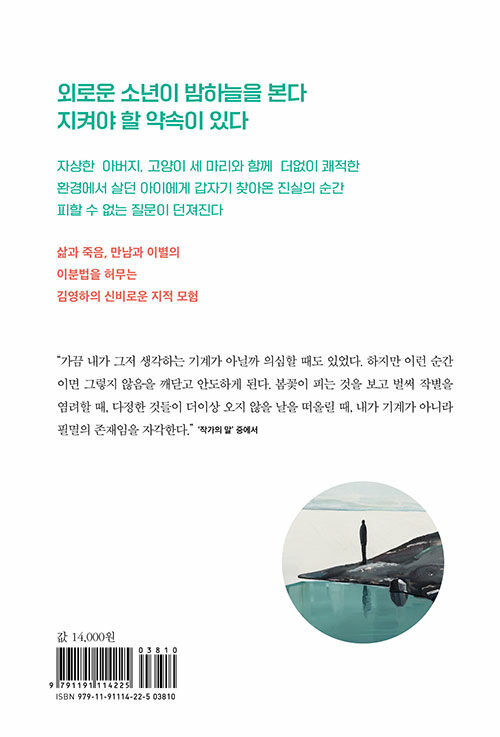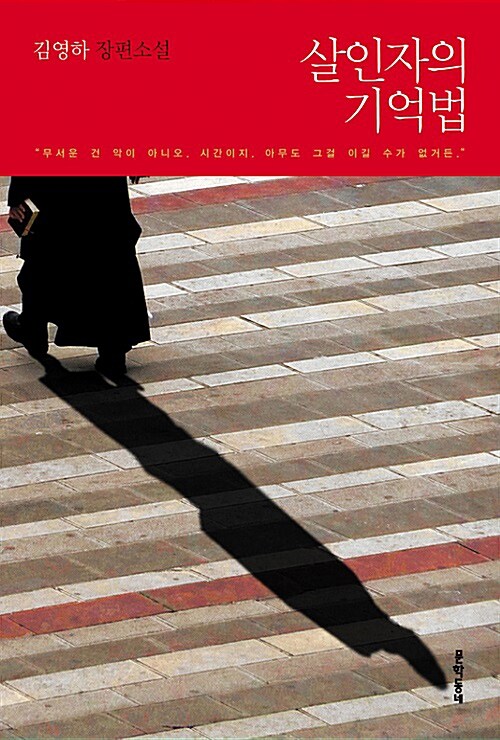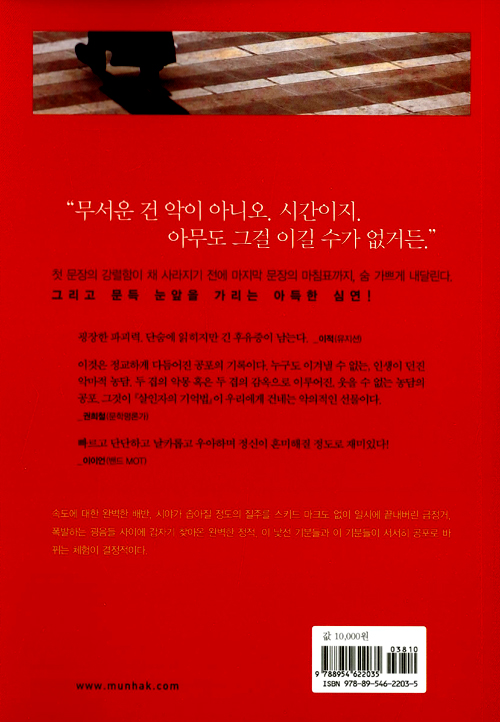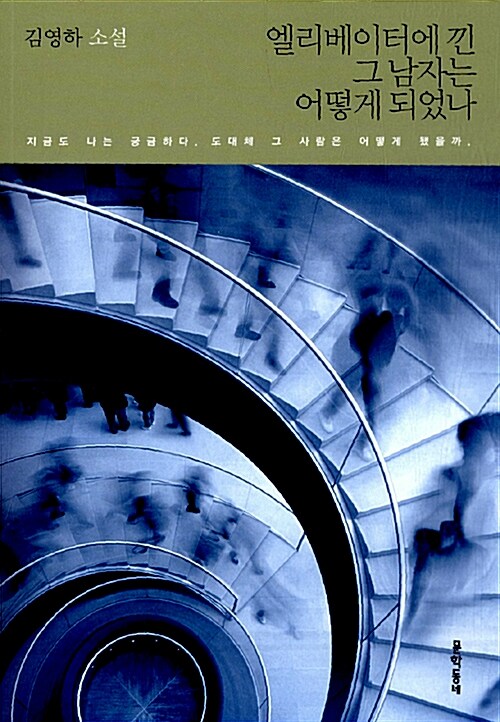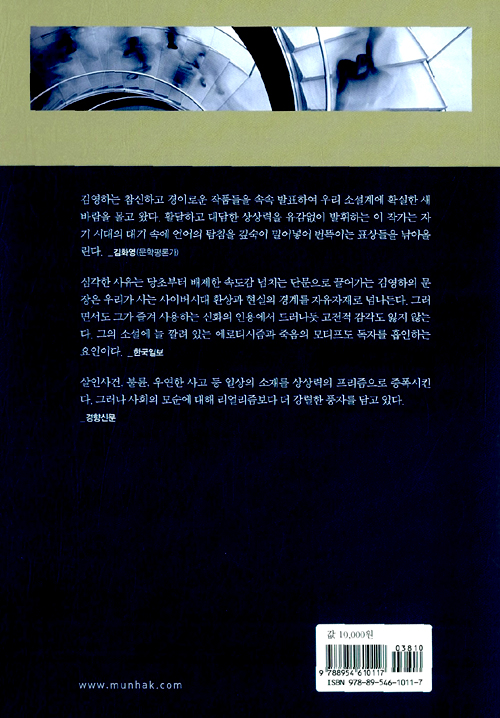김영하 (Kim Young-ha)
Showing 1–12 of 13 results
소설가. 장편소설로 『작별인사』, 『살인자의 기억법』, 『검은 꽃』, 『아랑은 왜』, 『나는 나를 파괴할 권리가 있다』, 『너의 목소리가 들려』, 『퀴즈쇼』, 소설집으로 『오직 두 사람』, 『무슨 일이 일어났는지는 아무도』, 『오빠가 돌아왔다』, 『엘리베이터에 낀 그 남자는 어떻게 되었나』, 『호출』이 있다. 여행에 관한 산문 『여행의 이유』와 『오래 준비해온 대답』을 냈고 산문집으로 『보다』, 『말하다』, 『읽다』의 합본인 『다다다』 등이 있다. F. 스콧 피츠제럴드의 『위대한 개츠비』를 번역하기도 했다. 서울에서 아내와 함께 살며 여행, 요리, 그림 그리기와 정원 일을 좋아한다.
Kim Young-ha is a modern South Korean writer. His first novel, published in Korean in 1996, was I Have the Right to Destroy Myself. It has been translated into English, French, German, Czech, Dutch, Polish, Turkish, Chinese, Vietnamese and Mongolian. His historical novel Black Flower, which won the Dong-in Literary Award in 2004, tells the story of Korean migrant workers in Mexico later involved in a Pancho Villa-led military uprising. Sources of inspiration for this novel came from classical Bildungsroman, stories of sea trips as illustrated by the popular film Titanic, ethnography of religion, as well as Korean histories of exile and immigration. Another instance of Kim’s mixed style is found in Your Republic Is Calling You, his fourth novel, in which he raises the question of human identity in a democratic and consumerist Korean society by presenting a North Korean spy and his family in Seoul in the manner of a crime fiction combined with a truncated family saga and naturalist depiction of everyday life. It has been translated into seven languages including English (US title: Your Republic Is Calling You).
Kim Young-ha is often judged as a writer skilled in rendering 1990’s urban sensibilities. Featuring a professional suicide assistant as a protagonist, I Have a Right to Destroy Myself pioneers a new realm in the genre of fantasy literature; stories contained in Summoning and What Happened to the Man Caught in the Elevator Door? tackle computer games, plastic art, cult movies, hostage situations, homosexuality, and other subject matters not commonly explored in Korean literature, which are becoming a part of modern reality. Kim’s stories utilize unfamiliar or even strange settings to explore the by-product of modern capitalism and urban culture, such as alienation and inability to communicate, extreme narcissism and its limitations. His second novel, Why Did Arang, centers on the legend of Arang. Murdered by her nanny, Arang becomes a ghost haunting all Miryang deputies in an attempt to expose her killer. The terrified deputies, however, die of fear as soon as they see the ghost, and Arang remains a woeful spirit until a deputy brave enough to stand the sight of her is assigned to Miryang region and finally avenges her. The ancient legend of Arang unfolds simultaneously with the story of two present day characters, hairdresser Yeongju and writer Park; and the narrator takes up the dual role of a storyteller recounting the legend of Arang as well as a detective providing hints and evidence necessary for solving the mysteries presented in the novel. Employing the devices of a detective novel, and at the same time parodying an ancient legend, Why Did Arang reveals that the author’s interest in the art of fiction extends beyond mere plot or characterization to the function of narrator and the very definition of storytelling.
Two films have already been based on his fiction: My Right to Ravage Myself (2003) and The Scarlet Letter, and the cinematic adaptation of Your Republic Is Calling You is currently in progress. in 2014, his novel, Brother Has Returned was used as the basis of the movie Total Messed Family. His novel, The Quiz Show, was also made into a musical. In addition, Kim’s work is popular with fans online who have made videos and animations of his work. In 2017, A Murderer’s Guide to Memorization was also adapted into the film Memoir of a Murderer.
Kim, along with John H. Lee, won Best Adapted Screenplay at the 2005 Grand Bell Awards for the script of A Moment to Remember.

